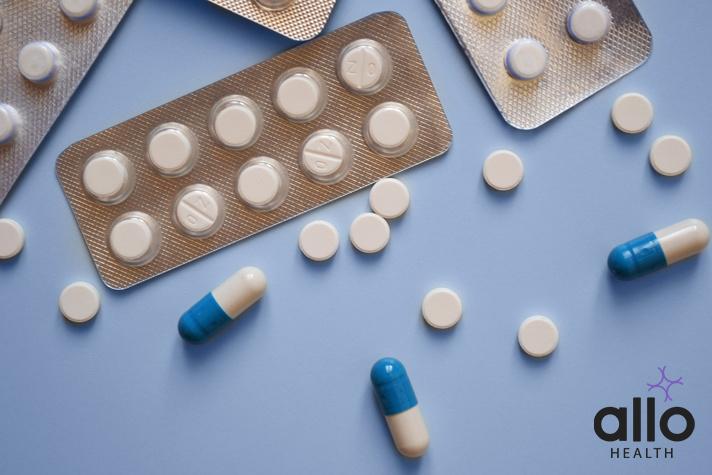Uses Of Cialis 10 mg

Allo Health is dedicated to personalized well-being, offering support and trusted information tailored to individual health goals. The platform emphasizes human-generated content, led by a distinguished medical team of experts, including physicians and sexual health specialists. Their commitment to credibility involves rigorous fact-checking, authoritative research, and continuous updates to ensure accurate, up-to-date information. Allo Health's unique approach goes beyond conventional platforms, providing expert-led insights and a continuous commitment to excellence, with user feedback playing a crucial role in shaping the platform's authoritative voice.

Dr. Aditi completed her undergraduate medical education at AJIMS, Mangalore, after which she worked in multi-speciality hospitals with COVID patients and in the Pain and Palliative medicine department. Driven by her experiences, she developed a keen interest in psychiatry. Dr. Aditi believes that mental health is just as, if not more important, than physical health.
Why This Was Upated?
Our experts continually monitor the health and wellness space, and we update our articles when new information became available.
Updated on 19 December, 2023
- Article was updated as part of our commitment to diversity, equity, and inclusion.

"The following blog article provides information about a drug or brand name drug and its potential effects or benefits. However, it is crucial to understand that this information is intended for general educational purposes only and should not be considered a substitute for professional medical consultation. It is highly recommended to consult with a qualified healthcare professional before making any decisions regarding medication, treatment, or healthcare management.
Book consultation
Individuals have unique medical conditions, and the information provided in this article may not be applicable to everyone. Only a qualified healthcare provider can evaluate your specific medical situation, taking into account your medical history, conducting appropriate tests, and providing personalized advice and recommendations. They are equipped to make informed decisions tailored to your individual needs.
It is crucial to emphasize that self-diagnosis, self-medication, or disregarding medical advice can have serious health consequences. This article may reference specific brand names or drugs for illustrative purposes. Mention of these names does not imply endorsement, recommendation, or guarantee of their efficacy or safety. The choice of medication should be based on discussions and individualized guidance from a healthcare professional who has a comprehensive understanding of your medical condition.
"Erectile dysfunction (ED) is one of the most common sexual health conditions in men, affecting millions of men worldwide. It can cause significant psychological distress, anxiety, and low self-esteem, affecting the quality of life of both the men and their partners. Fortunately, there are several treatments available for ED, including oral medications like Cialis 10mg.
What Is Cialis?
Cialis is the brand name for a medication called tadalafil. It is primarily used to treat erectile dysfunction (ED) in men, although it has other medical uses as well. Here is a detailed overview of Cialis:
- Purpose: Cialis is primarily prescribed to men who have difficulty achieving or maintaining an erection during sexual activity. This condition, known as erectile dysfunction (ED), can be caused by various factors, including psychological concerns, vascular concerns, or hormonal imbalances. Cialis helps improve blood flow to the penis, enabling men to achieve and sustain an erection when sexually aroused.
- Mechanism of Action: Tadalafil, the active ingredient in Cialis, belongs to a class of medications known as phosphodiesterase type 5 (PDE5) inhibitors. It works by inhibiting the enzyme PDE5, which can lead to relaxation of the smooth muscles in the blood vessels of the penis. This relaxation allows increased blood flow to the penis, resulting in an erection when sexual stimulation occurs.
- Duration of Action: One of the key advantages of Cialis is its longer duration of action compared to other ED medications like Viagra. Cialis can remain effective for up to 36 hours, earning it the nickname “the weekend pill.” This extended window of effectiveness allows for more spontaneity in sexual activity, as it doesn’t necessarily need to be taken immediately before intercourse.
- Dosage: Cialis comes in various dosages, typically ranging from 2.5 mg to 20 mg. The appropriate dosage depends on individual factors, including the severity of ED and the individual’s response to the medication. A healthcare provider will prescribe the most suitable dosage for each patient.
- Other Uses: Apart from treating ED, Cialis has other medical uses. It is sometimes prescribed to treat benign prostatic hyperplasia (BPH), a condition in which the prostate gland enlarges, causing urinary symptoms. Cialis can help relax the smooth muscles in the prostate and bladder, improving urine flow. Additionally, it can be used in combination with other medications to treat pulmonary arterial hypertension (PAH), a condition that affects the arteries in the lungs.
- Precautions: Cialis is generally considered safe when used as prescribed. It may interact with certain medications, especially those containing nitrates, which are commonly used to treat chest pain (angina). Combining Cialis with nitrates can lead to a dangerous drop in blood pressure. It’s essential to inform your healthcare provider about all medications and medical conditions you have before starting Cialis.
- Side Effects: Common side effects of Cialis can include headache, flushing, upset stomach, back pain, muscle aches, stuffy or runny nose, and dizziness. These side effects are usually mild and temporary. In rare cases, more serious side effects, such as priapism (a painful, prolonged erection), vision changes, or sudden hearing loss, may occur. If you experience any severe side effects, seek immediate medical attention.
- Accessibility: Cialis is available by prescription only and should only be taken under the guidance of a healthcare provider. Generic versions of tadalafil are also available, which can be more cost-effective but should be obtained through a reputable source.
Remember that Cialis is not a recreational drug and should not be used by individuals without a genuine medical need. It is essential to consult with a healthcare professional to determine if Cialis is a suitable treatment for your condition and to receive proper guidance on its use.
Uses Of Cialis
Cialis, which contains the active ingredient tadalafil, is primarily used for the treatment of erectile dysfunction (ED). It has several other medical uses as well. Here are the various uses of Cialis in detail:
- Erectile Dysfunction (ED): Cialis is most commonly prescribed to treat erectile dysfunction, a condition in which a man has difficulty achieving or maintaining an erection sufficient for sexual activity. It works by increasing blood flow to the penis, helping men with ED to achieve and sustain erections when sexually stimulated. Cialis is effective for up to 36 hours, which allows for a longer window of opportunity for sexual activity compared to some other ED medications.
- Benign Prostatic Hyperplasia (BPH): Cialis is also used to treat benign prostatic hyperplasia, a condition in which the prostate gland enlarges, causing urinary symptoms such as frequent urination, difficulty starting and stopping urine flow, and weak urine flow. Cialis can help relax the smooth muscles in the prostate and bladder, which can improve urine flow and alleviate BPH symptoms.
- BPH and ED Combination Therapy: In some cases, men may experience both erectile dysfunction and benign prostatic hyperplasia. Cialis can be prescribed as a combination therapy to address both conditions simultaneously.
- Pulmonary Arterial Hypertension (PAH): Cialis is used in the treatment of pulmonary arterial hypertension, a condition in which the arteries in the lungs become narrow and stiff, making it harder for blood to flow through them. Tadalafil helps relax the blood vessels in the lungs, reducing blood pressure and improving blood flow.
- Off-Label Uses: While not FDA-approved for these purposes, Cialis has been used off-label for conditions such as Raynaud’s disease, a condition that causes blood vessels to narrow and restrict blood flow to the extremities. Some studies have explored its potential use for female sexual arousal disorders, but its effectiveness in this regard is still under investigation.
- Sports and Bodybuilding: Some individuals misuse Cialis in the belief that it can enhance athletic performance or bodybuilding efforts. There is no scientific evidence to support such uses, and misuse of prescription medications can have serious health risks.
Cialis should only be used under the guidance of a healthcare provider and with a prescription. It is not intended for recreational use, and its use should be based on a legitimate medical need. Additionally, individuals considering Cialis should consult their healthcare provider to determine the appropriate dosage and to discuss potential interactions with other medications or underlying medical conditions.
Precautions Of Cialis
Taking Cialis (tadalafil) safely and effectively involves considering several precautions and guidelines to minimize potential risks and ensure the best outcomes. Here are detailed precautions to keep in mind when using Cialis:
- Medical Consultation: Before starting Cialis or any medication containing tadalafil, it is crucial to consult a healthcare provider. Discuss your medical history, current health conditions, and any medications you are taking to ensure that Cialis is safe and appropriate for you.
- Allergies: Inform your healthcare provider if you are allergic to tadalafil or any of the medication’s components. Allergic reactions can include skin rashes, itching, swelling of the face or throat, and difficulty breathing.
- Medication Interactions: Make sure your healthcare provider is aware of all medications you are taking, including prescription, over-the-counter, and herbal supplements. Cialis can interact with certain medications, especially those containing nitrates (commonly used for chest pain), alpha-blockers (used for high blood pressure or prostate concerns), and some antifungal or HIV medications. Combining Cialis with these drugs can lead to potentially dangerous drops in blood pressure or other adverse effects.
- Cardiovascular Health: Individuals with a history of cardiovascular concerns such as heart disease, angina, arrhythmias, or recent heart attacks should use Cialis with caution. The increased blood flow caused by Cialis can put additional stress on the heart. Discuss your cardiac health with your healthcare provider before using Cialis.
- Blood Pressure: Cialis can cause a decrease in blood pressure, which may result in dizziness, fainting, or falls. It is essential to monitor your blood pressure regularly and avoid activities that require alertness until you know how the medication affects you.
- Vision and Hearing Changes: Rarely, some people may experience vision or hearing changes while using Cialis, including blurred vision, sudden vision loss, or ringing in the ears (tinnitus). If you encounter any of these concerns, seek immediate medical attention.
- Priapism: Priapism is a rare but potentially serious side effect of Cialis. It involves a prolonged and painful erection lasting more than four hours. If this occurs, seek medical attention immediately, as untreated priapism can damage the penis and lead to permanent erectile dysfunction.
- Alcohol and Grapefruit Juice: Limit alcohol consumption while taking Cialis, as excessive alcohol can increase the risk of side effects, including dizziness and low blood pressure. Additionally, avoid grapefruit or grapefruit juice, as it can interact with Cialis and potentially increase tadalafil levels in the bloodstream.
- Pregnancy and Breastfeeding: Cialis is not intended for use in women and is not approved for pregnancy-related concerns. It is not known whether tadalafil passes into breast milk, so it’s important to consult with a healthcare provider if you are breastfeeding.
- Unapproved Uses: Do not use Cialis for any condition other than those for which it is prescribed. Using it for recreational purposes or without a legitimate medical need can be dangerous.
- Age and Dosage: Dosage adjustments may be necessary for older individuals or those with kidney or liver impairments. Your healthcare provider will determine the appropriate dosage for your specific situation.
Follow your healthcare provider’s instructions carefully when using Cialis and report any unusual or severe side effects promptly. Always obtain Cialis through a legitimate prescription and reputable sources to ensure its safety and effectiveness.

Side Effects Of Cialis
Cialis (tadalafil) is generally considered safe and effective when used as prescribed under the guidance of a healthcare provider. Like any medication, it can cause side effects in some individuals. Here are detailed side effects associated with Cialis:
Common Side Effects:
- Headache: Headaches are one of the most commonly reported side effects of Cialis. They are typically mild to moderate in intensity and can occur shortly after taking the medication.
- Flushing: Some people may experience a feeling of warmth or redness in the face, neck, or chest. This is known as flushing and is usually temporary.
- Upset Stomach: Gastrointestinal symptoms such as indigestion, stomach discomfort, or acid reflux can occur.
- Back Pain and Muscle Aches: Back pain and muscle aches are reported by some individuals taking Cialis. These side effects are usually mild and temporary.
- Stuffy or Runny Nose: Nasal congestion or a runny nose is a common side effect of Cialis.
Less Common Side Effects:
- Dizziness: Some people may experience dizziness or lightheadedness while taking Cialis. This effect is more likely to occur if you stand up quickly from a sitting or lying position.
- Vision Changes: Rarely, Cialis can cause changes in vision, including blurred vision, changes in color vision, or sensitivity to light. These side effects are usually temporary, but if they persist or worsen, seek medical attention.
- Hearing Changes: In rare cases, individuals may experience changes in hearing, including ringing in the ears (tinnitus) or sudden hearing loss. If these symptoms occur, seek immediate medical attention.
Serious Side Effects (Rare):
- Priapism: Priapism is a rare but serious side effect in which the penis remains erect for an extended period (typically more than four hours). If this occurs, it requires immediate medical attention, as untreated priapism can damage penile tissue and lead to permanent erectile dysfunction.
- Allergic Reactions: Although uncommon, some people may experience allergic reactions to Cialis, which can include skin rash, itching, swelling of the face, lips, or tongue, and difficulty breathing.
- Cardiovascular Effects: In rare cases, Cialis may lead to changes in blood pressure or heart rhythm. If you experience chest pain, palpitations, or any cardiovascular symptoms while taking Cialis, seek medical attention.
- Severe Skin Reactions: While extremely rare, severe skin reactions such as Stevens-Johnson syndrome or toxic epidermal necrolysis have been reported in association with tadalafil use. These are serious conditions that require immediate medical intervention.
- Seizures: Although very rare, some individuals may experience seizures while taking Cialis.
Most people who take Cialis do not experience serious side effects, and the common side effects are usually mild and tolerable. If you are concerned about the side effects or experience any unusual or severe reactions, contact your healthcare provider promptly.
Frequently Asked Questions
(1) What is Cialis 10 mg?
Cialis 10 mg is a medication containing the active ingredient tadalafil. It is used to treat erectile dysfunction (ED) in men. The 10 mg refers to the dosage strength of the medication.
(2) How does Cialis 10 mg work?
Cialis 10 mg works by increasing blood flow to the penis, helping men with ED achieve and maintain an erection when sexually aroused. It inhibits the enzyme PDE5, which can constrict blood vessels in the penis.
(3) When should I take Cialis 10 mg?
You should take Cialis 10 mg about 30 minutes before anticipated sexual activity. It can remain effective for up to 36 hours, allowing for greater flexibility in timing.
(4) How long does the effect of Cialis 10 mg last?
The effects of Cialis 10 mg can last up to 36 hours. This does not mean you will have an erection for that entire time; rather, it means you can achieve an erection during that window if sexually stimulated.
(5) Is Cialis 10 mg a daily medication?
Cialis is available in both daily and as-needed dosages. Cialis 10 mg is typically used as needed, but a lower 2.5 mg or 5 mg dose can be taken daily for men who anticipate regular sexual activity.
(6) Are there any common side effects of Cialis 10 mg?
Common side effects may include headache, flushing, upset stomach, back pain, muscle aches, and a stuffy or runny nose. These side effects are usually mild and temporary.
(7) Can I drink alcohol while taking Cialis 10 mg?
It’s best to limit alcohol consumption while taking Cialis 10 mg, as excessive alcohol can increase the risk of side effects, including dizziness and low blood pressure.
(8) Can I take Cialis 10 mg with food?
Cialis 10 mg can be taken with or without food. High-fat meals may delay its onset of action.
(9) Is Cialis 10 mg safe for everyone?
While generally safe, Cialis may not be suitable for individuals with certain medical conditions or those taking specific medications. It’s important to consult a healthcare provider to ensure safety.
(10) Where can I get Cialis 10 mg?
Cialis 10 mg is available by prescription only. You can obtain it from a healthcare provider or through an online pharmacy with a valid prescription.






































